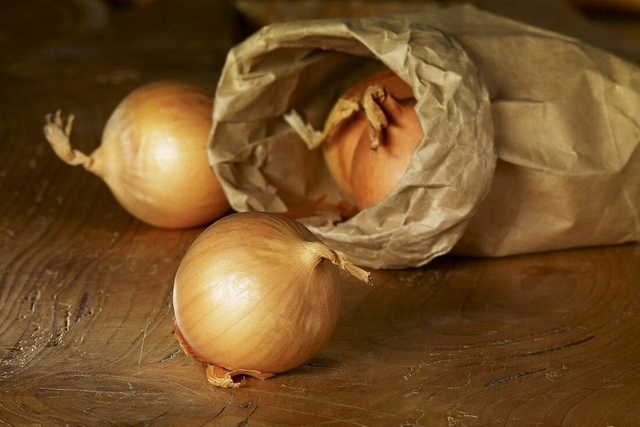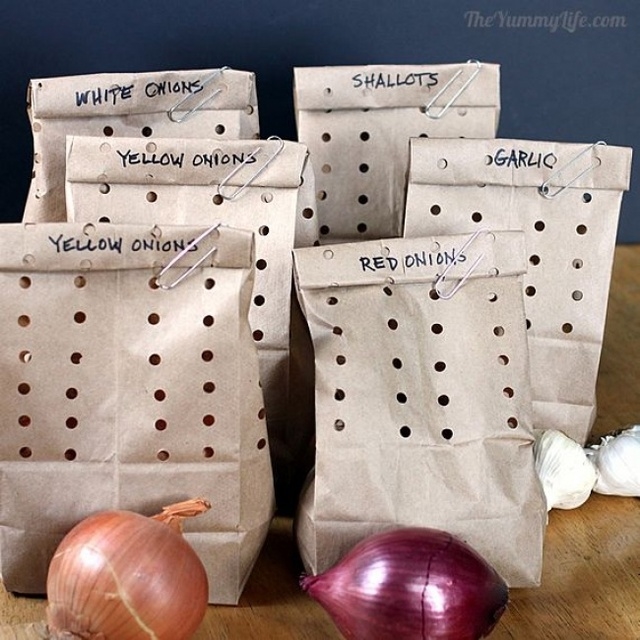Onions, as we know, belong to the allium family and are a familiar food that contains various essential nutrients for the human body.
They are rich in vitamins and minerals and have a low-calorie content. By consuming onions, you can supplement your body with a significant amount of minerals, fiber, and vitamins. Notably, this food is also high in vitamin C and rich in vitamin B, including folate and pyridoxine.
Additionally, the onion bulb contains a mineral that many people lack: potassium. It also contains organic sulfur compounds and a good amount of quercetin.
The benefits of onions are numerous: they help prevent cancer, lower the risk of stomach and colorectal cancer, contribute to diabetes treatment, and more. Fisetin and quercetin, flavonoid antioxidants found in onions, can inhibit tumor growth. Onions are also good for cardiovascular health, bone strength, digestion, and the immune system.
Knowing how to store onions properly helps us keep this food for an extended period without worrying about spoilage and waste.

Onions, if not stored properly, can easily spoil.
Storing Onions in the Freezer
The good news is that you can keep onions in the freezer at a temperature between 1°C and 4°C to prolong their shelf life. Fresh onions can be stored for up to 8 months this way. Cooked onions can be frozen for up to 12 months.
You can peel, slice, or chop the onions as desired. Then, place them in an airtight container, freezer bag, foil, or plastic wrap. When needed, simply take out the required amount and use it.
Storing Onions in an Airtight Container
To store onions for an extended period and keep them fresh, place them in an airtight container and store them in a dry, dark place.
Put the onions in the container and seal it shut. Store the container in a dark, cool place, away from direct sunlight and moisture. Every week, check the container and remove any onions showing signs of rot, softness, or discoloration to prevent the spread to other onions. The ideal storage temperature for onions is between 5 and 15 degrees Celsius to maintain freshness and hygiene.
Storing Onions in a Fabric Bag
Storing onions in a fabric bag is simple. Use a bag that resembles a pair of pants, and follow these steps:
Place an onion into the bag, and tie a knot or secure the opening to ensure the onion is enclosed. Continue adding onions and securing the bag until it is full or you have used all your onions. Once the bag is full, you can hang it in your kitchen or a well-ventilated area. This saves space and provides excellent storage conditions for onions, keeping them dry and airy, preventing moisture buildup, and reducing the risk of spoilage.

If you have unused onions, store them in mesh bags, paper bags, or even socks.
Removing Excess Outer Layers
Remove the excess outer layers by rubbing the onions between your palms. The loose skin that comes off should be discarded.
Storing Onions in Mesh Bags, Paper Bags, or Baskets
If you have unused onions, store them in mesh bags, paper bags, or even socks. Placing each onion in its own bag will prolong its life compared to storing them together. Ensure there is adequate ventilation to prevent moisture buildup and spoilage.
Alternatively, you can put onions in a pair of tights, tying a knot after each onion. This method not only separates the onions but also provides a dry and well-ventilated environment, absorbing moisture and prolonging their shelf life.
Notes When Buying Onions
– Avoid buying onions that have sprouted, as they won’t stay fresh for long.
– Also, refrain from choosing onions with a strong odor, indicating rot or decay beneath the outer layers.
– The best onions have dry, flaky skin that can be easily peeled away.
– Do not store onions with potatoes. The moisture from potatoes can cause onions to spoil, and potatoes can absorb the onion’s flavor, affecting the taste of your dishes.
According to GĐXH







































